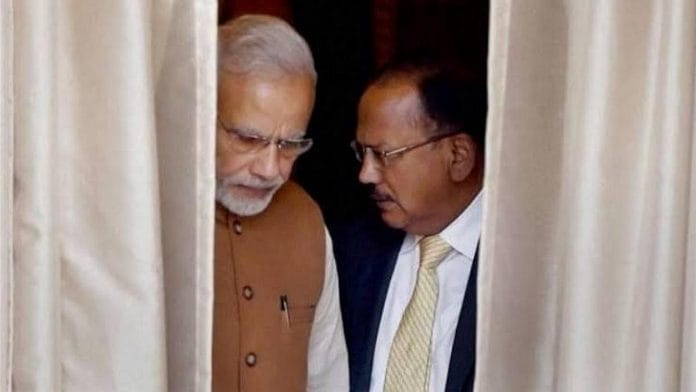The vision of a publicly available national security policy seems to be finally becoming a reality. The Constitution mandates the Union to protect the states against internal threats and external aggression, while the states are responsible for maintaining police forces and securing public order. A civilisational nation with vast sea and land borders, India has witnessed centuries of aggression, subjugation, and struggles to regain its unique identity. Our security challenges have been many, and our resilience as a nation has stood firm in the past, with or without a declared security policy.
Having a declared national security policy does not mean that, as a country, we did not have such a policy earlier. The National Security Agency (NSA), which was set up in 1998, was a step toward institutionalising the national security document. Today, 76 years after Independence, the Union government appears to have finally realised the need for a comprehensive national security policy that is expected to provide the doctrinal underpinnings of India’s strategic roadmap.
The efforts of the past
The need for a national security framework prompted several governments in the past to act on the issue of national defence in different ways, although not in an exhaustive and comprehensive manner. The National Security Act 1980 is more or less a law granting preventive detention rights to the government to stop a detainee from acting in any manner prejudicial to the country’s defence and security and its relations with foreign powers.
Twenty-five years ago, the Atal Bihari Vajpayee government constituted the National Security Council (NSC) with three tiers to oversee political, economic, security and energy security issues, especially concerning strategic importance. This high-level security organisation includes the National Security Advisor (NSA), Chief of Defence Staff (CDS), Deputy National Security Advisor, Ministers of Defence, External Affairs, Home Affairs, Finance, and the vice-chairman of NITI Aayog who is mandated to advise the prime minister and implement policies. Set up by the Manmohan Singh government in 2011, the Naresh Chandra Task Force submitted its report on national security in 2012. But it has not yet been made public.
Also read: Theaterisation isn’t duplicating units in all Services. ‘Satisficing’ has consequences in war
Reflect India’s vision
Even as governments change, threat perceptions and the need to remain vigilant are constant. Therefore, a comprehensive security policy should be in place to guide governments and their actions in this regard. The new national security policy should include the functions of the current NSC and provide a sufficient framework for coordinating the activities of the armed forces, intelligence and security agencies, and law enforcement wings of the governments.
But more importantly, the security policy is only one aspect of the doctrine that is being worked out. The outcome of this significant effort should reflect India’s vision, the gradual unfoldment of national purpose, the strategy to achieve the goal, and above all, a roadmap that will focus on domestic and global engagement. The domestic socio-political-economic policy of inclusivity and the creation of a welfare State – as enunciated in the Constitution – cannot be overlooked, nor can it be subject to the vagaries of political vicissitudes.
In addressing these challenges, it is crucial to consider the broader context of India’s economic landscape. The resilience of the economy amidst global uncertainties, as highlighted in discussions about domestic economic challenges, plays a significant role in shaping the national security policy.
India’s broad-based approach to domestic economic challenges and profoundly calibrated and balanced approach to global geopolitical dynamics has placed it in a coveted position of authority and responsibility. From being a torchbearer of the Non-Aligned Movement to championing multipolarity where two hegemonic powers, liberal and autocratic, are seeking to settle the issue of global pre-eminence, India has begun to assert its legitimate right to lead the world to peace and prosperity.
Also read: India must stop ‘all is well’ narrative against surprise attacks. Learn from Israel’s failure
Broaden the scope
To remain at these sweet spots and progress further, the political dispensations at the helm will have to ensure greater consensus at the domestic level. Besides, both these aspects will need deep deliberations at various levels and draw inputs from experts, academics, historians, defence veterans, and a wide range of social anthropologists, only to name a few.
India’s daunting economic and security challenges at the regional level also present a host of strategic opportunities. Considering the integrated security threats, there is an urgent need for the integrated security policy to include economic, trade, defence, foreign policy, and domestic social challenges.
India’s worldview has to find a place in its security policy, which will outline short-term and long-term strategies. The country is rightly regarded as the laboratory of human civilisation and the repository of universal human values cherished by humankind since time immemorial. Its importance in a world being torn apart by strife, conflict, and exploitation under various garbs needs no reiteration. The security policy should reflect the idea of Vasudhaiva Kutumbakam (The world is one family), the philosophy of one earth, one family, one future that the G20 summit under India’s presidency endorsed, and a domestic and global strategy to reach that goal.
Seshadri Chari is the former editor of ‘Organiser’. He tweets @seshadrichari. Views are personal.
(Edited by Humra Laeeq)






